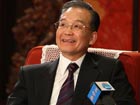| Videos | ? Latest |
|
? Feature | ? Sports | ? Your Videos |
Premier Wen: stimulus package effective, room for improvement
OVERCAPACITY
Amid increasing concerns of industrial overcapacity, Wen said the 1.18-trillion-yuan investment planned by the central government for 2009-2010 had not been and would not be spent on any industrial projects.
"The central government has spent 590 billion yuan this year mainly on affordable housing projects, infrastructure construction in rural areas, improving people's livelihoods, environmental protection, technological reform and building necessary infrastructure, such as the Beijing-Shanghai high-speed railway and major highway networks," he said.
"Industrial overcapacity has been a global issue, which fundamentally results from less demand and a shrinking market," Wen said.
In China, industrial overcapacity was also a result of the long-existing problem of an imbalanced economic structure, he said.
In October, 10 government departments jointly warned that China's economic recovery could be hampered by chaotic expansion, especially in the steel, cement, plate glass, coal chemical, poly-crystaline silicon and wind power equipment sectors.
"To resolve the problem of overcapacity, the most important thing is to take economic, environmental, legal and, if necessary, administrative measures to eliminate outdated capacity and, in particular, restrict the development of high-energy-consuming and polluting industries with excess capacity," Wen said.
STICKING TO PRO-GROWTH POLICIES
Wen said China would maintain its pro-active fiscal policy and moderately loose monetary policy to buoy the economy in 2010 as many uncertainties persisted at home and abroad.
Averting the trend of falling global demand remained difficult, and "economies of some countries are starting to pick up, but fluctuations are still possible," Wen said.
"China's economy has been on track for recovery. However, the economic performance and operations of enterprises still mainly rely on support from government policies."
In November last year, the government shifted the fiscal policy from "prudent" to "pro-active" and the monetary policy from "tight" to "moderately loose" to expand domestic investment and demand to stimulate the economy.
"To withdraw macro-economic policies too early will likely ruin the efforts made before and reverse the economic development," Wen said.
However, his government would adjust macro-economic policies inline with the changing economic situation and study issues arising during implementation of such policies.
China would gear more investment to social welfare, technical innovation and energy conservation and emission cuts next year, he said.
PRESSURE FOR RENMINBI APPRECIATION DISMISSED
Wen said China would not yield to pressure for the appreciation of its currency, the yuan or renminbi, in any form.
"A stable Chinese currency benefits the international community."
Some countries demanded yuan appreciation while practicing trade protectionism against China, said Wen, adding that these were aimed at checking China's development.
"They (some countries) create trade barriers in various ways, putting great pressure on Chinese export-led enterprises," Wen said.
"China will work with other countries to curb trade protectionism and push forward the Doha Round of trade negotiations," Wen said.
Figures from the Ministry of Commerce showed that at the end of November, 19 countries and regions had launched 103 trade-related investigations against Chinese products. Both the number of the cases and the money involved was at record high.
In the first 11 months, China's foreign trade totaled 1.96 trillion U.S. dollars, down 17.5 percent from the same period last year.
Exports stood at 1.07 trillion U.S. dollars, down 18.8 percent year on year, and imports at 893.02 billion U.S. dollars, down 15.8 percent, according to the General Administration of Customs.
China should adjust its export structure and improve the quality of products to maintain export share in the international market, Wen said.

 0 Comments
0 Comments







